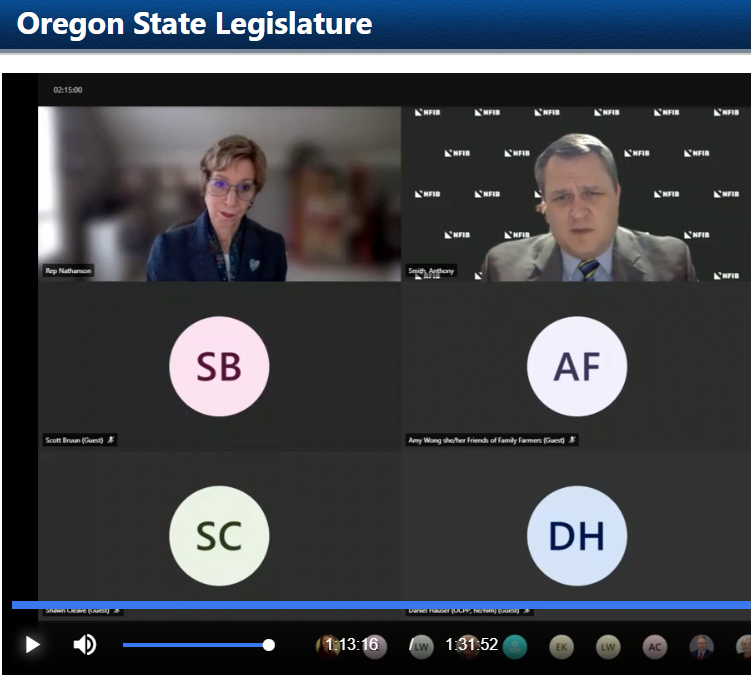NFIB testifies against bills disconnecting state from the CARES Act
State Director Anthony Smith reports from Salem on the small-business agenda as of February 12.
It’s Day 25 of the 160-day Oregon Legislative Session and while House, Senate, and joint committees are meeting at a furious pace (averaging about 15-20 hearings per day) no bills have received votes yet in either chamber. That will likely change around February 23, which is the bill introduction deadline, the first major deadline of the 2021 session.
Over 2,000 bills have been introduced so far, but as The Oregonian has reported, the Oregon Legislature is on track to bring forward around 4,000 bills this year, which would be more individual pieces of legislation than we’ve seen introduced in a single session for more than a decade.
The most emergent topic, so far, has been the issue of the CARES Act disconnect bills.
Disconnecting from the CARES Act
Senate Bill 137 and House Bill 2839 both had public hearings within the last week. The two bills essentially do the same thing. NFIB testified in opposition to both measures, which you can watch here. Or, read the written testimony NFIB submitted below:
Chair Nathanson, Vice-chairs Pham and Reschke, and members of the Committee:
Thank you for the opportunity to provide this written testimony in opposition to HB 2839, which would disconnect Oregon from several tax relief provisions of the federal CARES Act. As a reminder, the National Federation of Independent Business (NFIB) represents thousands of small businesses across the state, many being the smallest of small businesses, with about 90% of our members in Oregon having fewer than 25 employees and 70% having fewer than 10 employees.
In response to the coronavirus pandemic, the United States Congress recognized the financial hardships families and businesses have experienced because of sudden job losses and business closures by passing the CARES Act with overwhelming bipartisan support. Among other provisions, the CARES Act authorized Economic Impact Payments (stimulus checks) for individuals and made significant reforms to the federal tax code to provide tax relief to businesses. Both policies sought to address the core problem of reduced cashflow and liquidity.
As the committee heard from the Oregon Society of Certified Public Accountants last week, Oregon normally connects automatically to the federal tax code – and there are of number of good reasons for doing so. HB 2839 would change that standard practice, making Oregon businesses ineligible for state-level tax relief that would otherwise flow their way. HB 2839 would divert much-needed cash from the pockets of struggling Oregon businesses to state coffers, making it harder for small businesses to keep their doors open and put unemployed Oregonians back to work.
HB 2839 would disconnect Oregon from three parts of the CARES Act: the business loss limitation provision, the net operating loss provision, and the business interest limitation provision. The combined effects of these key features the CARES Act allow for the immediate monetization of business losses, rather than having to carry losses forward to future tax years, and allows for an increased deduction for interest paid, recognizing that many businesses are having to borrow in order to ride out the pandemic. The primary purpose of these provisions is to address liquidity in a time when most businesses are experiencing challenging cashflow issues.
Two of the three provisions have received quite a lot of attention from proponents, as well as in recent media coverage, but the significance of the net operating loss provision has often been understated. This provision has no income thresholds tied to it – and it only benefits those businesses that have suffered losses. If the state truly wants to provide targeted relief to the businesses that need it most, this provision does exactly that, and has the potential to provide immediate liquidity to thousands of struggling business owners – especially important for those with low-to-moderate levels of income and a lack of cash reserves.
If HB 2839 becomes law, the state would deny much-needed tax relief to thousands of Oregon businesses totaling $83.9 million in the current biennium and $32.6 million for the 21-23 biennium, based on the best available figures produced by LRO to date. By the 23-25 biennium, this policy change would negatively impact the state budget by $25.4 million. With the future of the economic recovery still largely unknown, this could exacerbate future state budget holes, while it is still unclear whether the state will need to fill a budget hole for the 21-23 biennium as talks of a relief package for the states continue between the Biden administration and the new Congress.
By passing HB 2839, the state would be prioritizing its own possible budget needs over the immediate cashflow needs of Oregon businesses – and the jobs that those businesses provide to working Oregonians. These businesses have been asked to play a critical role in stopping the spread of COVID-19. Many were required to shutter their doors. More have seen a drastic drop in sales – and nearly every business is now required to enforce public health and safety mandates. All these factors have had significant financial impacts on Oregon’s small businesses. The last thing any of them need right now is a higher tax bill.
NFIB respectfully asks the Legislature to protect Oregon businesses and the jobs Oregonians depend on by opposing HB 2839.
It’s hard to predict what the Legislature will end up doing with these bills, but hopefully they will hit the pause button for a while. It doesn’t make a lot of sense for them to pass any tax increases right now, especially before the next quarterly revenue forecast, which is scheduled for February 24 – and really, they probably shouldn’t act on tax bills before we know what (if anything) Congress is going to provide the states in the next relief package, and what the final revenue forecast looks like on May 19. This is the forecast that matters for the purposes of balancing the state budget.

